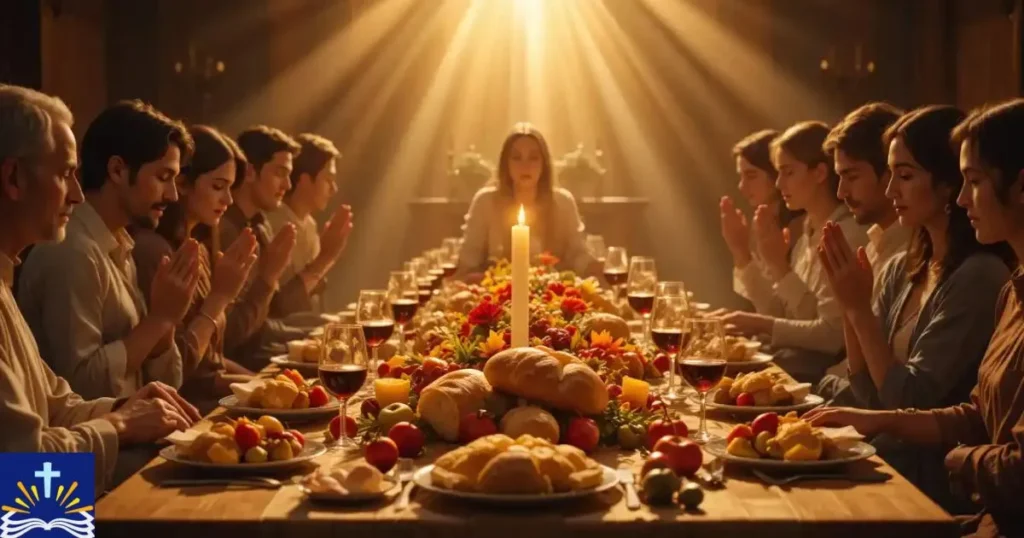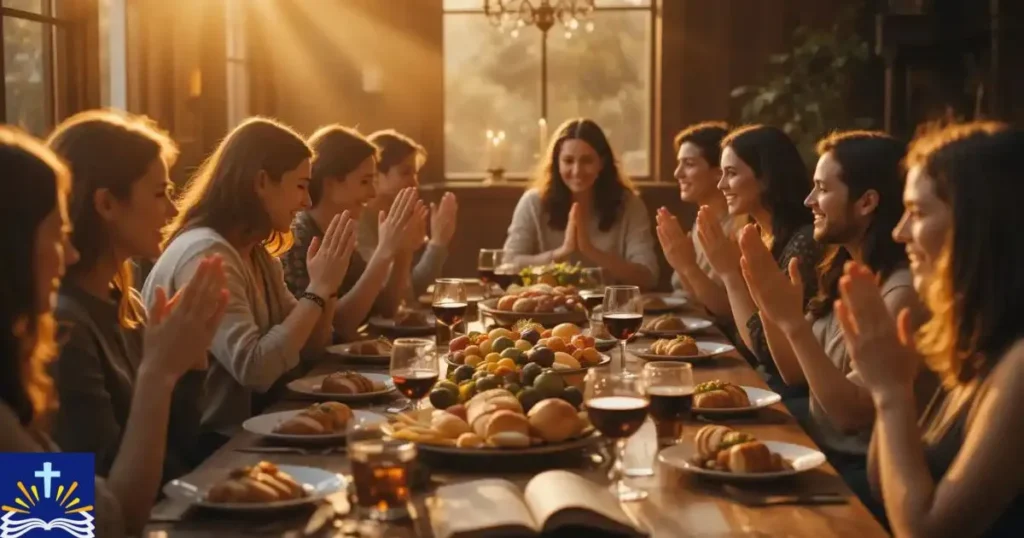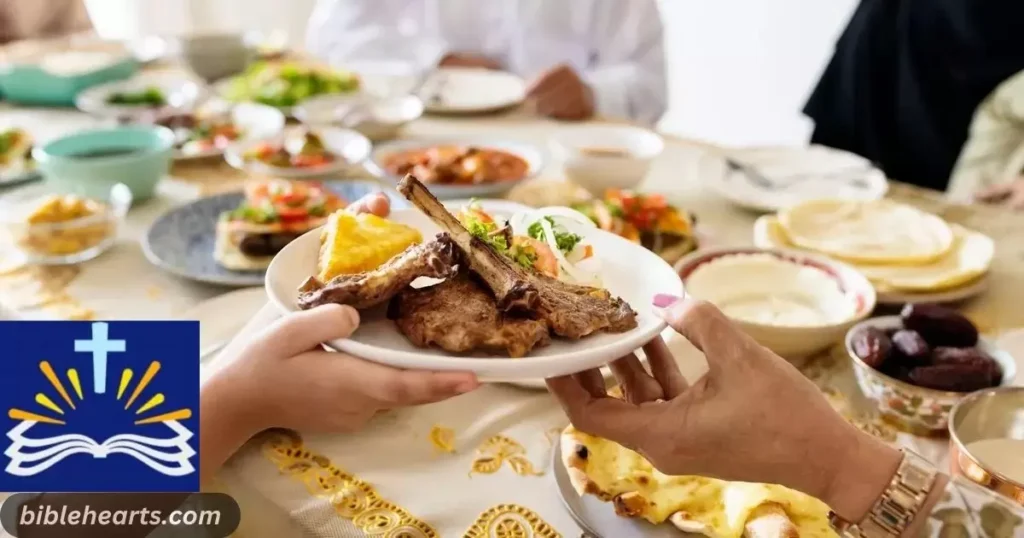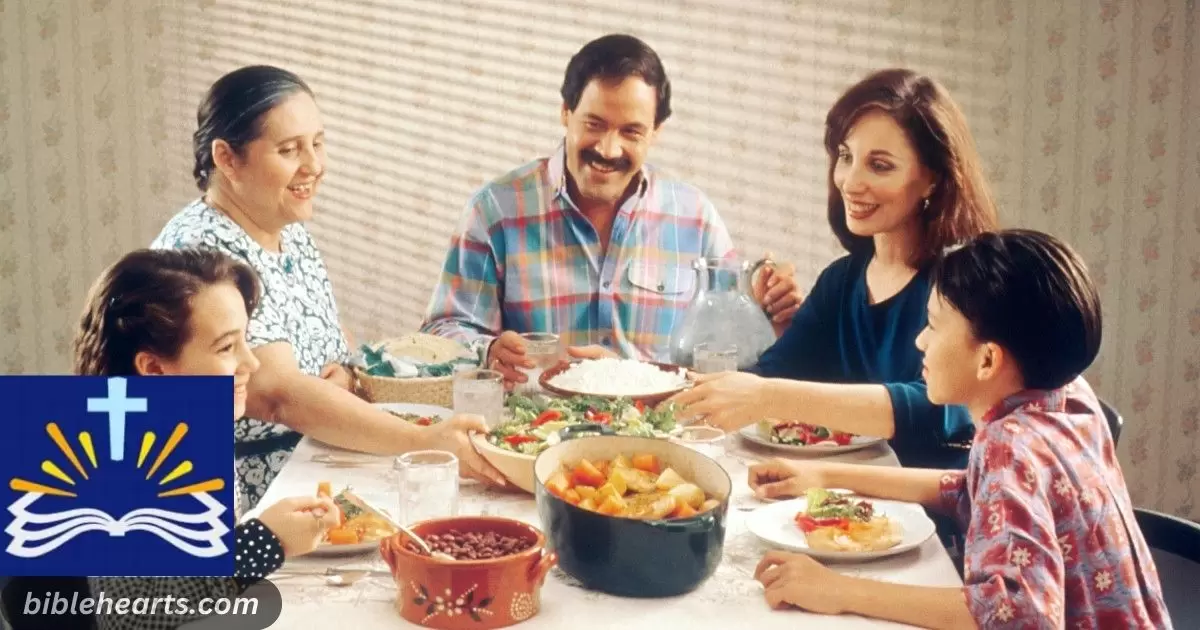“Breaking bread together is more than just eating—it is an act of love, unity, and fellowship that strengthens relationships and honors God.”
From the earliest days, sharing meals has been a sacred practice. In the Bible, eating together represents hospitality, community, and spiritual connection. Jesus Himself often ate with His disciples, sinners, and the needy, using those moments to teach love, grace, and the importance of unity.
Whether at the Last Supper, feeding the 5,000, or enjoying meals with friends like Mary, Martha, and Lazarus, Jesus showed that food is not just for nourishment but a tool for building relationships. The Bible reminds us that eating together fosters love, gratitude, and godly fellowship, bringing people closer to one another and to God.
Sharing meals has always been more than just a physical act of eating; it serves as a profound symbol of community, fellowship, and spiritual connection. The Bible underscores the importance of shared meals, illustrating how breaking bread together can strengthen relationships and enhance spiritual growth.
From Old Testament feasts to New Testament gatherings, Scripture provides rich insights into the significance of communal eating. In this blog post, we delve into various Bible verses that highlight the importance of eating together. These Scriptures not only emphasize the physical and spiritual benefits of shared meals but also offer guidance on how such practices can foster unity and deepen our faith. By understanding these biblical teachings, we can appreciate the spiritual and communal value of eating together.
The Spiritual Significance of Meals

- Acts 2:46 – “Every day they continued to meet together in the temple courts. They broke bread in their homes and ate together with glad and sincere hearts.”
- Luke 24:30 – “When he was at the table with them, he took bread, gave thanks, broke it and began to give it to them.”
- John 21:12 – “Jesus said to them, ‘Come and have breakfast.’ None of the disciples dared ask him, ‘Who are you?’ They knew it was the Lord.”
- 1 Corinthians 10:16 – “Is not the cup of thanksgiving for which we give thanks a participation in the blood of Christ? And is not the bread that we break a participation in the body of Christ?”
- Revelation 3:20 – “Here I am! I stand at the door and knock. If anyone hears my voice and opens the door, I will come in and eat with that person, and they with me.”
- Matthew 26:26 – “While they were eating, Jesus took bread, and when he had given thanks, he broke it and gave it to his disciples, saying, ‘Take and eat; this is my body.’”
Bible Verses About Eating and Drinking Together

The Bible emphasizes the importance of fellowship over meals. Whether in celebrations, gatherings, or moments of spiritual reflection, sharing food brings people together.
1. Acts 2:46 (KJV)
“And they, continuing daily with one accord in the temple, and breaking bread from house to house, did eat their meat with gladness and singleness of heart.”
2. 1 Corinthians 10:31 (KJV)
“Whether therefore ye eat, or drink, or whatsoever ye do, do all to the glory of God.”
3. Ecclesiastes 9:7 (KJV)
“Go thy way, eat thy bread with joy, and drink thy wine with a merry heart; for God now accepteth thy works.”
4. Luke 24:30-31 (KJV)
“And it came to pass, as he sat at meat with them, he took bread, and blessed it, and brake, and gave to them. And their eyes were opened, and they knew him; and he vanished out of their sight.”
5. Psalm 133:1 (KJV)
“Behold, how good and how pleasant it is for brethren to dwell together in unity!”
6. Romans 14:17 (KJV)
“For the kingdom of God is not meat and drink; but righteousness, and peace, and joy in the Holy Ghost.”
7. Luke 14:13-14 (KJV)
“But when thou makest a feast, call the poor, the maimed, the lame, the blind: And thou shalt be blessed; for they cannot recompense thee: for thou shalt be recompensed at the resurrection of the just.”
8. John 6:35 (KJV)
“And Jesus said unto them, I am the bread of life: he that cometh to me shall never hunger; and he that believeth on me shall never thirst.”
9. Proverbs 15:17 (KJV)
“Better is a dinner of herbs where love is, than a stalled ox and hatred therewith.”
10. Isaiah 25:6 (KJV)
“And in this mountain shall the Lord of hosts make unto all people a feast of fat things, a feast of wines on the lees, of fat things full of marrow, of wines on the lees well refined.”
Proverbs About Eating Together

The book of Proverbs offers wisdom about eating and the importance of a peaceful table. It teaches that love, contentment, and righteousness are more valuable than rich feasts filled with strife.
- Proverbs 17:1 (KJV) – “Better is a dry morsel, and quietness therewith, than a house full of sacrifices with strife.”
- Proverbs 23:1-3 (KJV) – “When thou sittest to eat with a ruler, consider diligently what is before thee: And put a knife to thy throat, if thou be a man given to appetite. Be not desirous of his dainties: for they are deceitful meat.”
- Proverbs 25:16 (KJV) – “Hast thou found honey? Eat so much as is sufficient for thee, lest thou be filled therewith, and vomit it.”
Jesus Sharing Meals in the Bible

Jesus frequently shared meals with His disciples, sinners, and the needy. He used these moments to teach love, humility, and the importance of spiritual nourishment.
- The Last Supper (Luke 22:19-20) – Jesus established communion as a way to remember His sacrifice.
- Feeding the 5,000 (Matthew 14:19-20) – Jesus multiplied five loaves and two fish to feed thousands, showing God’s provision.
- Dinner at Zacchaeus’ House (Luke 19:5-7) – Jesus dined with a tax collector, proving God’s love for all sinners.
- Meal with Mary and Martha (Luke 10:38-42) – Jesus reminded Martha that spiritual nourishment is more important than busyness.
- Breaking Bread at Emmaus (Luke 24:30-31) – Jesus revealed Himself to His disciples through a shared meal after His resurrection.
The Significance of Eating Together
Eating together in the Bible represents:
- Fellowship and unity (Acts 2:46).
- God’s provision and blessing (Psalm 104:14-15).
- Spiritual nourishment (John 6:35).
- A symbol of God’s kingdom (Revelation 19:9).
- A time for gratitude and joy (Ecclesiastes 9:7).
Bible Verses About Sharing and Giving

The Bible teaches that sharing food and resources with others is an act of love and obedience to God.
1. Hebrews 13:16 (KJV)
“But to do good and to communicate forget not: for with such sacrifices God is well pleased.”
2. Proverbs 19:17 (KJV)
“He that hath pity upon the poor lendeth unto the Lord; and that which he hath given will he pay him again.”
3. Matthew 25:35 (KJV)
“For I was an hungred, and ye gave me meat: I was thirsty, and ye gave me drink: I was a stranger, and ye took me in.”
4. Acts 20:35 (KJV)
“I have shewed you all things, how that so labouring ye ought to support the weak, and to remember the words of the Lord Jesus, how he said, It is more blessed to give than to receive.”
5. Luke 6:38 (KJV)
“Give, and it shall be given unto you; good measure, pressed down, and shaken together, and running over, shall men give into your bosom. For with the same measure that ye mete withal it shall be measured to you again.”
6. Galatians 6:2 (KJV)
“Bear ye one another’s burdens, and so fulfil the law of Christ.”
7. Deuteronomy 15:11 (KJV)
“For the poor shall never cease out of the land: therefore I command thee, saying, Thou shalt open thine hand wide unto thy brother, to thy poor, and to thy needy, in thy land.”
8. James 2:15-16 (KJV)
“If a brother or sister be naked, and destitute of daily food, And one of you say unto them, Depart in peace, be ye warmed and filled; notwithstanding ye give them not those things which are needful to the body; what doth it profit?”
9. 2 Corinthians 9:7 (KJV)
“Every man according as he purposeth in his heart, so let him give; not grudgingly, or of necessity: for God loveth a cheerful giver.”
10. Isaiah 58:10 (KJV)
“And if thou draw out thy soul to the hungry, and satisfy the afflicted soul; then shall thy light rise in obscurity, and thy darkness be as the noonday.”
Feasts and Festivals as Symbols of Unity

- Deuteronomy 14:26 – “Use the silver to buy whatever you like: cattle, sheep, wine or other fermented drink, or anything you wish. Then you and your household shall eat there in the presence of the Lord your God and rejoice.”
- Nehemiah 8:10 – “Nehemiah said, ‘Go and enjoy choice food and sweet drinks, and send some to those who have nothing prepared. This day is sacred to our Lord. Do not grieve, for the joy of the Lord is your strength.’”
- Exodus 12:8 – “That same night they are to eat the meat roasted over the fire, along with bitter herbs, and bread made without yeast.”
- Leviticus 23:2 – “Speak to the Israelites and say to them: ‘These are my appointed festivals, the appointed festivals of the Lord, which you are to proclaim as sacred assemblies.’”
- Isaiah 25:6 – “On this mountain the Lord Almighty will prepare a feast of rich food for all peoples, a banquet of aged wine— the best of meats and the finest of wines.”
Meals as Acts of Service and Hospitality

- Hebrews 13:2 – “Do not forget to show hospitality to strangers, for by so doing some people have shown hospitality to angels without knowing it.”
- 1 Peter 4:9 – “Offer hospitality to one another without grumbling.”
- Luke 10:38-42 – “As Jesus and his disciples were on their way, he came to a village where a woman named Martha opened her home to him. She had a sister called Mary, who sat at the Lord’s feet listening to what he said. But Martha was distracted by all the preparations that had to be made. She came to him and asked, ‘Lord, don’t you care that my sister has left me to do the work by myself? Tell her to help me!’ ‘Martha, Martha,’ the Lord answered, ‘you are worried and upset about many things, but few things are needed—or indeed only one. Mary has chosen what is better, and it will not be taken away from her.’”
- Acts 16:15 – “When she and the members of her household were baptized, she invited us to her home. ‘If you consider me a believer in the Lord,’ she said, ‘come and stay at my house.’ And she persuaded us.”
- Romans 12:13 – “Share with the Lord’s people who are in need. Practice hospitality.”
- Titus 1:8 – “Rather he must be hospitable, one who loves what is good, who is self-controlled, upright, holy and disciplined.”
The Role of Shared Meals in Building Community
- Acts 2:42 – “They devoted themselves to the apostles’ teaching and to fellowship, to the breaking of bread and to prayer.”
- Acts 2:44-45 – “All the believers were together and had everything in common. They sold property and possessions to give to anyone who had need.”
- 1 Corinthians 11:33 – “So then, my brothers and sisters, when you gather to eat, you should all eat together.”
- John 13:14 – “Now that I, your Lord and Teacher, have washed your feet, you also should wash one another’s feet.”
- Colossians 3:16 – “Let the message of Christ dwell among you richly, as you teach and admonish one another with all wisdom through psalms, hymns, and songs from the Spirit, singing to God with gratitude in your hearts.”
- Galatians 6:2 – “Carry each other’s burdens, and in this way you will fulfill the law of Christ.”
Bible Verses About Tarot Cards
Celebrating God’s Provision Through Meals
- Deuteronomy 8:10 – “When you have eaten and are satisfied, praise the Lord your God for the good land he has given you.”
- Psalm 104:14-15 – “He makes grass grow for the cattle, and plants for people to cultivate—bringing forth food from the earth: wine that gladdens human hearts, oil to make their faces shine, and bread that sustains their hearts.”
- Matthew 6:11 – “Give us today our daily bread.”
- John 6:35 – “Then Jesus declared, ‘I am the bread of life. Whoever comes to me will never go hungry, and whoever believes in me will never be thirsty.’”
- Psalm 23:5 – “You prepare a table before me in the presence of my enemies. You anoint my head with oil; my cup overflows.”
- 1 Timothy 4:4-5 – “For everything God created is good, and nothing is to be rejected if it is received with thanksgiving, because it is consecrated by the word of God and prayer.”
The Eucharist: A Special Meal of Faith

- Luke 22:19 – “And he took bread, gave thanks and broke it, and gave it to them, saying, ‘This is my body given for you; do this in remembrance of me.’”
- 1 Corinthians 11:24 – “and when he had given thanks, he broke it and said, ‘This is my body, which is for you; do this in remembrance of me.’”
- Matthew 26:27 – “Then he took a cup, and when he had given thanks, he gave it to them, saying, ‘Drink from it, all of you.’”
- 1 Corinthians 11:25 – “In the same way, after supper he took the cup, saying, ‘This cup is the new covenant in my blood; do this, whenever you drink it, in remembrance of me.’”
- John 6:53 – “Jesus said to them, ‘Very truly I tell you, unless you eat the flesh of the Son of Man and drink his blood, you have no life in you.’”
- Acts 20:7 – “On the first day of the week we came together to break bread. Paul spoke to the people and, because he intended to leave the next day, kept on talking until midnight.”
Meals as Opportunities for Outreach and Fellowship
- Luke 14:12 – “Then Jesus said to his host, ‘When you give a luncheon or dinner, do not invite your friends, your brothers or sisters, your relatives, or your rich neighbors; if you do, they may invite you back and so you will be repaid.’”
- Matthew 25:35 – “For I was hungry and you gave me something to eat, I was thirsty and you gave me something to drink, I was a stranger and you invited me in.”
- Galatians 6:10 – “Therefore, as we have opportunity, let us do good to all people, especially to those who belong to the family of believers.”
- Acts 2:47 – “Praising God and enjoying the favor of all the people. And the Lord added to their number daily those who were being saved.”
- Romans 12:13 – “Share with the Lord’s people who are in need. Practice hospitality.”
- Hebrews 13:16 – “And do not forget to do good and to share with others, for with such sacrifices God is pleased.”
How can shared meals strengthen community and spiritual connections?
Answer: Shared meals can strengthen community and spiritual connections by fostering fellowship, promoting unity, and providing opportunities for service and outreach. Through communal eating, believers can deepen their relationships with one another, celebrate God’s provision, and reinforce spiritual teachings. Meals offer a setting for mutual support, gratitude, and the reinforcement of shared faith values, aligning with biblical principles of community and hospitality.
ANSWERS TO KEY QUESTIONS
1. What is the biblical significance of shared meals?
Shared meals in the Bible signify fellowship, unity, and spiritual nourishment. They are seen as opportunities for community building, celebrating God’s blessings, and reinforcing spiritual teachings (Acts 2:46, John 21:12).
2. How do feasts and festivals in the Bible relate to spiritual growth?
Feasts and festivals in the Bible are symbols of joy, gratitude, and spiritual renewal. They serve as occasions to celebrate God’s provision and strengthen communal bonds (Deuteronomy 14:26, Isaiah 25:6).
3. What role does hospitality play in biblical meals?
Hospitality is a key aspect of biblical meals, emphasizing service to others and creating inclusive environments. It reflects God’s love and care for all people, including strangers and those in need (Hebrews 13:2, Luke 10:38-42).
4. How can the practice of eating together enhance church community?
Eating together enhances church community by fostering deeper relationships, mutual support, and shared spiritual experiences. It creates opportunities for fellowship and growth within the church body (Acts 2:42, Colossians 3:16).
5. What is the significance of the Eucharist in the Christian faith?
The Eucharist, or Holy Communion, is a sacred meal that commemorates Christ’s sacrifice and symbolizes the unity of believers. It is a vital aspect of Christian worship and a means of spiritual nourishment (Luke 22:19, 1 Corinthians 11:24-25).
Conclusion
Shared meals in Scripture reveal the profound role of communal eating in building relationships, celebrating God’s provision, and enhancing spiritual growth. Whether through feasts, hospitality, or the Eucharist, these practices underscore the importance of coming together to nourish both body and soul.
By embracing the biblical principles of eating together, we can cultivate a spirit of unity, gratitude, and faith, reflecting the rich traditions of fellowship and worship found in the Bible.

Hi! I’m Jane Austen, a classic novelist known for my keen observations on society and relationships, bringing timeless tales to life.










